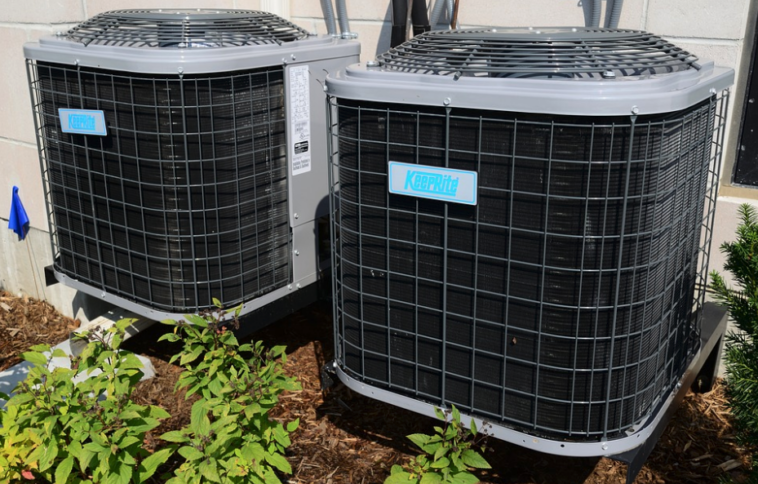An energy-efficient HVAC system can save money on monthly electricity bills while providing better indoor air quality from reduced humidity levels and improved filtration systems. Energy-efficient HVAC systems are designed to consume less energy than traditional models by using advanced technologies such as variable speed compressors and integrated zoning systems. You can use several vital tips and strategies to ensure your HVAC system is as energy-efficient as possible.
HVAC system components and how each can affect the unit’s efficiency
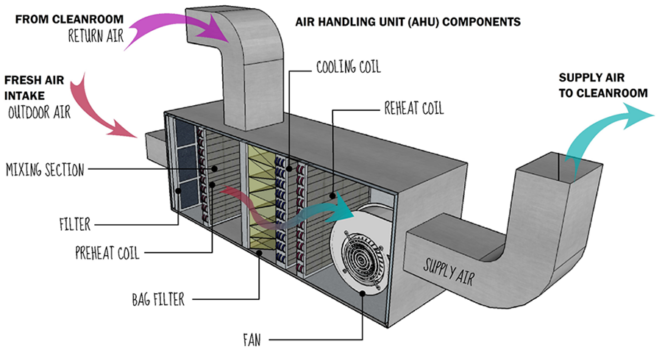
First, it is essential to understand an HVAC system’s components and how each can affect the unit’s efficiency. Heating equipment such as furnaces, boilers, and heat pumps provide heat to a building. This type of equipment uses electricity or fuel to generate heat distributed throughout a home or business. The energy used will depend on the building’s size, the type of heating equipment installed, and how efficiently it operates. Some of these systems may also be equipped with variable-speed fans, which help distribute warm air more evenly within a space while reducing energy consumption.
The cooling component of an HVAC system is typically composed of an air conditioner or heat pump. Air conditioning units cool the air by using refrigerants which are compressed and then released to cool the air inside a building. Similarly, heat pumps transfer heat from one interior space to another to maintain comfortable temperatures. It is essential to have regular maintenance done on your cooling equipment as this will help ensure it runs at peak efficiency while also reducing energy consumption.
Your ventilation system helps regulate indoor air quality by supplying fresh outdoor air into the building while exhausting stale indoor air. An energy-efficient ventilation system can be achieved through proper insulation and tight seals around your building’s doors, windows, ducts, vents, and other openings. Additionally, you should evaluate the effectiveness of your ventilation system by ensuring that all registers and vents are open and free of obstruction.
An HVAC system’s air filtration component helps reduce indoor allergens while providing cleaner air. Filters should be changed regularly to ensure efficiency in the unit. Additionally, installing an electronic air cleaner can help reduce dust particles, pollen, and other airborne contaminants for improved indoor air quality.
The controls used to operate an HVAC system are essential for maintaining comfortable temperatures within a space without wasting energy. A programmable thermostat lets you set the temperature schedules corresponding to when occupants will be in the home or office, allowing maximum energy efficiency when no one is around. Additionally, zone dampers are helpful for more significant buildings as they help regulate temperatures in different parts of the building without adjusting settings throughout the entire space.
How To Go Green with Your HVAC
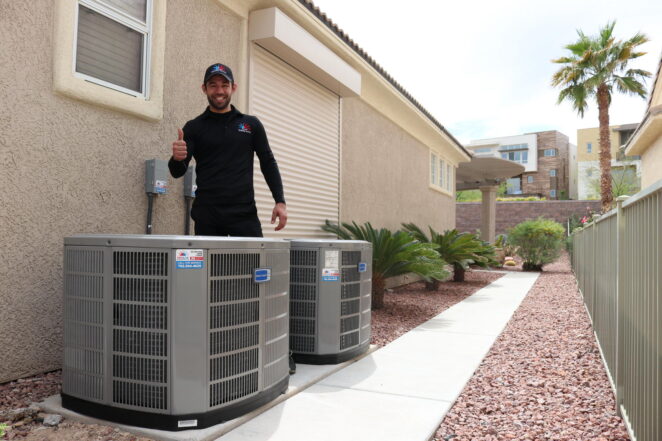
There are several ways a user can go green with their HVAC system to reduce energy consumption and minimize environmental impact. Here are some tips:
Upgrade to Energy-Efficient Equipment
Consider replacing old, inefficient HVAC units with energy-efficient models that carry the ENERGY STAR® certification. These units are designed to consume less energy while providing the same level of performance.
Regular Maintenance
Schedule routine maintenance for your HVAC system. This includes cleaning or replacing filters, checking refrigerant levels, and inspecting for any leaks or issues. Proper maintenance ensures that the system operates efficiently and reduces energy waste.
Smart Thermostat Installation
Invest in a programmable or smart thermostat that allows you to control the temperature settings more effectively. These thermostats can be programmed to adjust the temperature based on your schedule, optimizing energy usage by reducing heating or cooling when it’s not necessary.
Optimize Temperature Settings
Adjusting the temperature settings can significantly impact energy consumption. During winter, set your thermostat to a lower temperature and wear warmer clothing. In the summer, set it to a higher temperature and use fans to circulate the air. Each degree of adjustment can lead to energy savings.
Improve Insulation
Ensure that your home is well-insulated to prevent heat loss during winter and heat gain during summer. Proper insulation helps your HVAC system work more efficiently and reduces the need for excessive heating or cooling.
Seal Air Leaks
Identify and seal any air leaks in your home, including gaps around windows and doors, ductwork, and other potential areas of air leakage. Sealing these leaks prevents conditioned air from escaping, improving the overall efficiency of your HVAC system.
Utilize Natural Ventilation
When weather permits, take advantage of natural ventilation by opening windows and allowing fresh air to circulate. This can reduce reliance on air conditioning and provide a natural cooling effect.
Consider Zoning Systems
If feasible, install zoning systems that allow you to heat or cool specific areas of your home independently. This way, you can avoid wasting energy by conditioning unoccupied or less frequently used spaces.
Use Ceiling Fans
Ceiling fans can help circulate air and create a wind-chill effect, making you feel more comfortable without relying solely on air conditioning.
Renewable Energy Sources
Explore options to power your HVAC system with renewable energy sources such as solar panels. Generating clean energy can offset the environmental impact of your HVAC system’s electricity consumption.
By implementing these green practices, you can minimize energy waste, reduce your carbon footprint, and contribute to a more sustainable and eco-friendly HVAC system.
The different types of HVAC systems
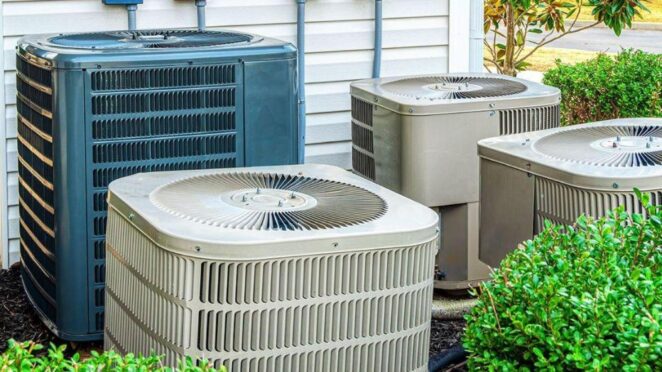
Learn about the types of available heating, ventilation, and air conditioning (HVAC) systems. Understanding the different options for controlling temperature and humidity in your home or office building to decide what system will work best.
The most prevalent type of HVAC system is a split-system unit that combines heating and cooling components into one central unit. This system requires less energy than traditional separate units as it only uses one compressor instead of two. Split systems are more affordable than traditional systems and can provide consistent temperatures throughout the building. Some models even feature zoning capabilities that allow you to control the temperature of certain selected areas in your home for added convenience.
Another energy-efficient HVAC option is a geothermal system, which uses the heat from underground to cool your home in the hot, dry summer months and warm it during winter. This system requires no additional fuel source as it captures thermal energy from deep below ground level, making it cost-effective and environmentally friendly. Additionally, some geothermal units come equipped with air purification features that help keep indoor air clean and free of dust, allergens, and other airborne particles.
Regular maintenance
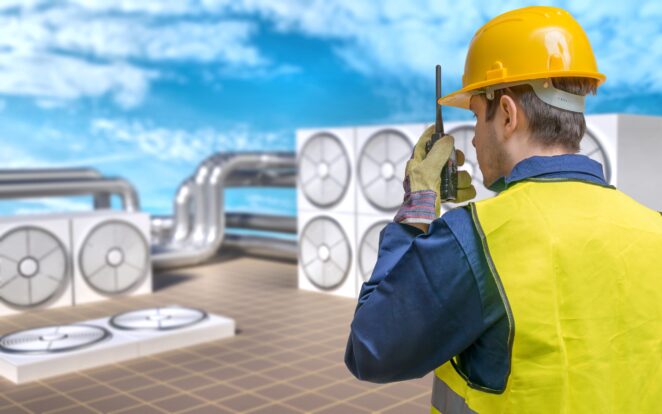
Proper maintenance is also essential for reducing utility bills and ensuring a longer lifespan of HVAC systems. Regular servicing of filters and other components is needed to keep dust, dirt, and debris from building up in the unit and clogging it up over time. Additionally, scheduling annual tune-ups with an experienced technician will help ensure that your cooling or heating system is running in peak condition and that all safety features are functioning correctly. Find out more about professional HVAC installers at https://envirosmartsolution.com/.
Investing in an energy-efficient HVAC system is worth it as it would pay for itself in the long
run since it can greatly help lower a home’s electricity bill. Heat pumps are one of the best options when it comes to HVAC systems with high-energy efficiency. If you are interested in getting a heat pump installed, you can check out this guide to home heat pumps in Cincinnati to learn more about it to see if it is the best option for you.
The bottom line
Following these tips and strategies for energy-efficient HVAC systems can save money on your monthly utility bills while providing improved indoor air quality. It is crucial to do the regular maintenance of your system will be necessary to ensure peak performance from the unit and maximize savings. Additionally, it will be beneficial to consult with an experienced and professional technician who can evaluate your current HVAC system’s efficiency and suggest improvements that will provide more significant savings in the long run.



